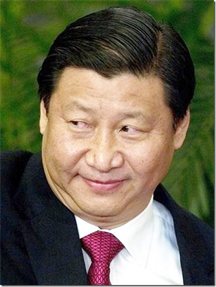BEIJING, (Reuters) – China’s president-in-waiting, Xi Jinping, has said the ruling Communist Party must embrace reform with fresh vigour to stave off social and economic malaise, sources said, citing accounts of comments he made at a meeting with a party reformer.

Xi met the prominent reformer, Hu Deping, in the past six weeks, the sources said, in a gesture intended to show he was listening to voices calling for not only faster economic liberalisation but also a relaxation of political controls.
China’s new leadership team, to take the reins of power from March next year, faces a slowing economy and demands from inside and outside the party to tackle problems that reformists see as threats to both growth and social stability – such as a yawning wealth gap, limited political freedom and corruption.
“The problems that China has accumulated are unprecedented,” one of the sources said, paraphrasing what he said was a written summary of Xi’s remarks circulated among some retired officials.
“We must seek progress and change while remaining steady,” Xi was quoted as saying.
Xi’s comments suggested that his priorities on taking over from President Hu Jintao would be to shore up China’s slowing and maturing economy and to give a boost to private business with tax reductions and other incentives, said one source.
Another source said Xi also recognised the need to deal with “corruption and ill-discipline in the party” as a top priority.
The amassing of wealth by Chinese officials’ families has become a source of public anger and a sensitive topic for Beijing. Last weekend, China demoted a top official, partly because his son was involved in a deadly crash of a luxury sports car, sources close to the leadership say.
In June, news agency Bloomberg upset Beijing by documenting the considerable wealth of Xi’s extended family.
The account of Xi’s meeting with Hu Deping have been compiled from three sources who are all close to serving and retired officials and who spoke on condition of anonymity because of the sensitivity of discussing party affairs.
Hu could not be reached for comment. He is a member of the Chinese People’s Political Consultative Con-ference, an advisory body that convenes in tandem with the national parliament.
XI’S AGENDA
EMERGING
In the private meeting, Xi also urged restraint by advocates of more radical change, the sources said.
But his relatively unguarded comments mark a rare break from his reluctance to spell out an agenda for running the world’s second biggest economy – a habit needed to survive Chinese politics, where deference to the incumbent leader is expected.
They also add to the impression of an incoming leader seeking to strike a new note of calculated urgency after years of caution under President Hu, amid strikingly open calls for decisive reform from intellectuals and policy advisers.
In recent days, Chinese websites have circulated a withering assessment of Hu’s decade in power by an editor at a weekly newspaper run by the Central Party School. Xi is president of the school, and some members of his brains trust work on the campus in northwest Beijing, which trains rising officials.
“Overall, in this decade China has achieved considerable success and progress. But behind success there are also problems,” said the commentary by Deng Yuwen, a deputy editor of the Study Times newspaper.
“If we speak candidly, this decade has seeded or created massive problems, and the problems are even more numerous than the achievements,” said the commentary, which first appeared on the Caijing business magazine until it was taken down.
Deng said problems include an over-reliance on investment to power the economy, failure to nurture a secure middle class, urban-rural disparities, pollution, “ideological bankruptcy” and, above all, failure to pursue political reforms.
Though Xi’s comments will disappoint advocates of outright democratic change and sweeping privatisation, he has hinted that gradual political reforms aimed at tethering some of the Communist Party’s powers could come later, the sources said.
“We’ve got to hold high the banner of reform, including political system reform,” a source said, paraphrasing Xi.
“But Xi has said that people are tired of big talk with no action, so he’ll avoid making unrealistic promises.”
Xi is all but certain to be confirmed as China’s next top leader at the Communist Party’s 18th congress, which sources said was likely to be convened in mid-October.
The sources added that Xi and his new team of leaders would hold a series of year-end policy-planning conferences before formally taking over the reins of government power in March.
‘NO FRIEND OF BO’
Xi, 59, is the son of Xi Zhongxun, a reformist official who served under Hu Deping’s father, Hu Yaobang, in the 1980s. Xi Zhongxun remained sympathetic to Hu Yaobang after he was ousted in 1987 after party conservatives accused him of ideological laxity and softness in responding to student protests.
Hu Deping, 69, is a retired industry and commerce official who has continued to promote his father’s reformist legacy through memoirs and meetings. He is not related to President Hu.
In the meeting, Xi distanced himself from disgraced senior politician Bo Xilai, once seen as a candidate for the top rung of party leadership before his wife was accused of murder in a scandal that has roiled the party succession. The wife, Gu Kailai, was given a suspended death sentence last month.
Some rumours have suggested Xi remained protective of Bo, who irked liberal reformers by promoting ambitious egalitarian policies and evoking nostalgia for traditional socialism. But Xi told Hu Deping he was no ally of Bo, two of the sources said.
“He said Bo’s case would be handled strictly according to party discipline (rules) and state law,” one of them said.




